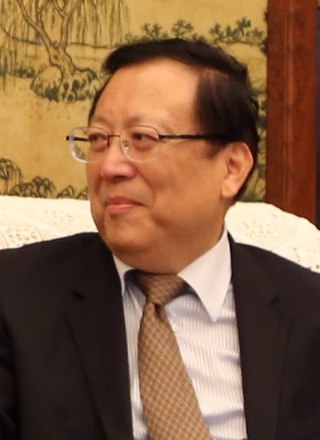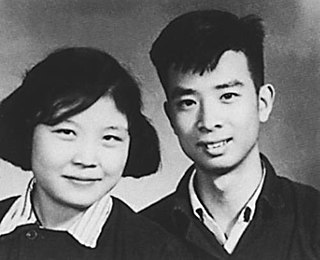PKU can refer to:
- Phenylketonuria, a genetic disease
- Peking University (PKU), a public university in Haidian, Beijing, China
- Pku, an Armenian musical instrument
- Sultan Syarif Kasim II International Airport (IATA code), in Pekanbaru, Riau, Indonesia
PKU can refer to:

Phenylketonuria (PKU) is an inborn error of metabolism that results in decreased metabolism of the amino acid phenylalanine. Untreated PKU can lead to intellectual disability, seizures, behavioral problems, and mental disorders. It may also result in a musty smell and lighter skin. A baby born to a mother who has poorly treated PKU may have heart problems, a small head, and low birth weight.

Peking University is a public university in Haidian, Beijing, China. It is affiliated with and funded by the Ministry of Education of China. The university is part of Project 211, Project 985, and the Double First-Class Construction.
Ivar Asbjørn Følling was a Norwegian physician and biochemist. He first described the disease commonly known as Følling's disease or phenylketonuria (PKU).
Founder Group (方正集团) is a major Chinese technology conglomerate that deals with information technology, pharmaceuticals, real estate, finance, and commodities trading. It is divided into five major industry groups, each covering a separate industry: PKU Founder IT Group (IT), PKU Healthcare Group, PKU Resource Group, Founder Financial (finance), and Founder Commodities. The group has been coping with bankruptcy since 2020, when the Beijing No.1 Intermediate People's Court announced the recognized leader during the restructuring.

6-Pyruvoyltetrahydropterin synthase deficiency is an autosomal recessive disorder that causes malignant hyperphenylalaninemia due to tetrahydrobiopterin deficiency. It is a recessive disorder that is accompanied by hyperphenylalaninemia. Commonly reported symptoms are initial truncal hypotonia, subsequent appendicular hypertonia, bradykinesia, cogwheel rigidity, generalized dystonia, and marked diurnal fluctuation. Other reported clinical features include difficulty in swallowing, oculogyric crises, somnolence, irritability, hyperthermia, and seizures. Chorea, athetosis, hypersalivation, rash with eczema, and sudden death have also been reported. Patients with mild phenotypes may deteriorate if given folate antagonists such as methotrexate, which can interfere with a salvage pathway through which dihydrobiopterin is converted into tetrahydrobiopterin via dihydrofolate reductase. Treatment options include substitution with neurotransmitter precursors, monoamine oxidase inhibitors, and tetrahydrobiopterin. Response to treatment is variable and the long-term and functional outcome is unknown. To provide a basis for improving the understanding of the epidemiology, genotype–phenotype correlation and outcome of these diseases, their impact on the quality of life of patients, and for evaluating diagnostic and therapeutic strategies a patient registry was established by the noncommercial International Working Group on Neurotransmitter Related Disorders (iNTD).

Adele Dorothy Diamond is a professor of neuroscience at the University of British Columbia, where she is currently a Tier 1 Canada Research Chair in Developmental Cognitive Neuroscience. One of the pioneers in the field of developmental cognitive neuroscience, Diamond researches how executive functions are affected by biological and environmental factors, especially in children. Her discoveries have improved treatment for disorders such as phenylketonuria and attention-deficit hyperactivity disorder, and they have impacted early education.
Robert Guthrie, MD, Ph.D. was an American microbiologist, best known for developing the bacterial inhibition assay used to screen infants for phenylketonuria at birth, before the development of irreversible neurological damage. Guthrie also pioneered the collection of whole blood on specially designed filter paper, commonly known as "Guthrie cards" as a sample medium that could be easily collected, transported and tested. Although Guthrie is best known for developing the test for phenylketonuria, he worked tirelessly to raise awareness of the need to screen for treatable conditions and adapted his method to early screening tests for galactosemia and maple syrup urine disease.

The pku, alternatively spelled pzuk,(in Armenian “Պկու”) is an Armenian musical instrument, similar to a clarinet. It has been called the national instrument of Armenia. The pku is a single-reed aerophone with seven holes and a one octave range with the open cone of a bull horn at one end.

Han Qide is a Chinese physician and politician. Han is currently the chairman of the Jiusan Society and a member of the Chinese Communist Party. He was the Vice Chairman of the Standing Committee of the National People's Congress and is the Vice Chairman of the National Committee of the Chinese People's Political Consultative Conference. He is also the president of the Chinese Society for Science and Technology.

Hyperphenylalaninemia is a medical condition characterized by mildly or strongly elevated concentrations of the amino acid phenylalanine in the blood. Phenylketonuria (PKU) can result in severe hyperphenylalaninemia. Phenylalanine concentrations are routinely screened in newborns by the neonatal heel prick, which takes a few drops of blood from the heel of the infant. Standard phenylalanine concentrations in unaffected persons are about 2-6mg/dl phenylalanine concentrations in those with untreated hyperphenylalaninemia can be up to 20 mg/dL. Measurable IQ deficits are often detected as phenylalanine levels approach 10 mg/dL. Phenylketonuria (PKU)-like symptoms, including more pronounced developmental defects, skin irritation, and vomiting, may appear when phenylalanine levels are near 20 mg/dL .Hyperphenylalaninemia is a recessive hereditary metabolic disorder that is caused by the body's failure to convert phenylalanine to tyrosine as a result of the entire or partial absence of the enzyme phenylalanine hydroxylase.
Peking University HSBC Business School is a graduate-level business school, under the auspices of Peking University, located in Shenzhen, Guangdong, China, at the university's only satellite campus. PHBS was founded in 2004 and, following HSBC's direct and indirect charity donation to the school in 2008, became the first Chinese institution of higher education to offer English-only business programs at a Master's level.

The Peking University Shenzhen Graduate School is a public research university established as a satellite graduate school of Peking University in 2001 via a joint venture with the Shenzhen Municipal Government. It is situated inside the University Town of Shenzhen, along with the graduate schools of Tsinghua University and the Harbin Institute of Technology.

Hao Ping is a Chinese historian and academic administrator who has served as the party secretary of Peking University since June 2022. He served as president of Peking University from 2018 to 2022, Chinese vice minister of education from 2009 to 2016, and president of Beijing Foreign Studies University from 2005 to 2009.

Tang Yijie was a Chinese scholar and professor at Peking University, who has been described as China's top scholar on philosophy and Chinese studies. He spearheaded the Confucian Canon project, seeking to compile all known classical works on Confucianism, and was the first director of the Institute of Confucian Studies at Peking University.
It is the postgraduate leadership program at Yenching Academy of Peking University in Beijing, China. Announced in 2014 and established in 2015, it is the first such program to launch in China. The highly selective program offers Yenching Scholarships, including tuition, accommodation, transportation, and a living stipend, to all students in the Academy. Yenching Scholars are selected annually from around the world through a competitive admission process. Unlike most graduate master's degrees in China that run two years for professional degrees and three years for academic degrees, the program lasts one year. There is also the option for Scholars to extend their studies for a second year, as well as the opportunity for Scholars to continue with doctoral studies at Peking.

Peking University Resources (Holdings) Co., Ltd. known also as PKU Resources is a Chinese listed company. The company was incorporated in Bermuda and listed in the Hong Kong Stock Exchange. The company is an indirect non-wholly-owned subsidiary of Peking University, which in turn under the administration of the Ministry of Education. The company is broadly considered a state-owned enterprise of China. For the same reason, PKU Resources is a red chip company.

Sinobioway Group Co., Ltd. was one of the university-owned enterprises of Peking University. The company currently majority (60%) owned by a Peking University professor and other employee of Peking University. The pinyin of the Chinese short name was Wèimíng Jítuán, literally Anonymous Group. However, Sinobioway was not related to other Weiming Group, such as Weiming (Fujian) Investment Group.

PKU Healthcare Corp., Ltd. formerly known as PKU International Healthcare Group Southwest Pharmaceutical Co., Ltd., is a Chinese pharmaceutical company. The major shareholder was PKU Healthcare Group, a subsidiary of PKU Founder Group. PKU Founder Group itself is a subsidiary of Peking University, in turn making the listed company a state-owned enterprise by broader definition.

Peking University Law School is a law school of Peking University, a public research university in Beijing, China.